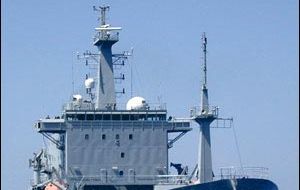MercoPress. South Atlantic News Agency
State of the art HMS Scott takes over Ice Patrol HMS Endurance Antarctica duties
 The sixth largest vessel of the Royal Navy HMS Scott is equipped with the best deep ocean survey capabilities
The sixth largest vessel of the Royal Navy HMS Scott is equipped with the best deep ocean survey capabilities The Royal Navy's advanced deep water survey ship HMS Scott was deployed this week to the Antarctic for the first time. She will take over patrolling and surveying duties in Antarctica and the South Atlantic from Ice Patrol HMS Endurance.
This is the first time HMS Scott's state-of-the-art sonar suite has been deployed to the Antarctic and it is hoped her work will help deepen understanding of this little-known part of the world and the marine environment.
The ship's other aim will be to maintain the United Kingdom's presence in the region during Austral summer 2009/2010.
“We're deploying to the Antarctic to support the British Antarctic Survey and the Foreign and Commonwealth Office. It's a rare opportunity to make a difference in this far-flung part of the world, and we're all very excited about it. We'll be helping to ensure that the frozen continent remains unspoiled, and this is particularly important in the year of the fiftieth anniversary of the Antarctic Treaty” said Executive Officer of HMS Scott, Lieutenant Commander Phil Harper.
HMS Scott's deep ocean survey capability was well demonstrated after the Boxing Day Tsunami, when her survey of the fault zone was able to show exactly where the disaster had started, helping provide a new effective early earthquake warning system. HMS Scott, the Royal Navy's only deep-water ocean survey vessel presents a contrasting life for all junior sailors.
Even for survey recorders who have experienced life on board the Royal Navy's survey ships HMS Endurance and HMS Roebuck, life on board HMS Scott shows how varied the survey squadron is in terms of both quality of life and operational capability.
The first thing that strikes new sailors on board is the extra space. HMS Scott is the sixth largest vessel in the Royal Navy and yet has a small ship's company of only 52. Despite this relatively small crew - they can demonstrate the qualities of the Royal Navy by displaying the flexibility, capability and resilience of the personnel that make up this professional ship's company.
The majority of time for the survey recorders is spent on watch-keeping in the 'mission' space. Survey recorders new to the ship need to forget everything they have learned about conventional hydro-graphic surveying and be prepared for a world of computer monitors and plotters. Also, it comes as quite a shock to them, learning that survey lines can be up to 400 miles long!
All raw bathymetric data is processed using the CARIS survey processing system to ensure it is accurate and clear. Also onboard is the moving vessel profiler multi-sensor towed array system, which is the commanding officer's pride and joy. This technical wizardry can analyse all manner of oceanographic variables from salinity to sound speed throughout the water.
The ship has completed a successful ten-month refit beginning in August 2008 recently achieved the culmination of a challenging period of trials and training. The highlights included a full certification of her sonar equipment, successful marine engineering trials, and most recently, world-class training delivered by the staff of Flag Officer Sea Training in and around Plymouth.
HMS Scott will also fulfil the Ice Patrol duties such as maintaining sovereign presence in the South Atlantic with defence diplomacy and supporting the global community of Antarctica.
The ship helps support the following agreements: The UK was the first state to ratify the Antarctic Treaty and remains committed to upholding its core values of preserving the continent for peace and science. The UK also continues to strongly support the Antarctic Treaty and its Protocol on Environmental Protection 1991.
The UK is committed to ensuring the highest possible standards of environmental protection in Antarctica and we will continue to work with other treaty parties to achieve this aim.
The Portsmouth-based HMS Endurance – nicknamed the Red Plum – nearly sank after water flooded her engine room in the South Atlantic last December and had to be “piggy-backed” to England. The Royal Navy has still not said how much it will cost to repair and who will do the work.
However Plymouth RN sources understand Endurance's repair would keep her out of service until 2011, by which time she will be 20 years old. But some fear she may never work again given the extent of the damages suffered in the accident.


Top Comments
Disclaimer & comment rulesCommenting for this story is now closed.
If you have a Facebook account, become a fan and comment on our Facebook Page!